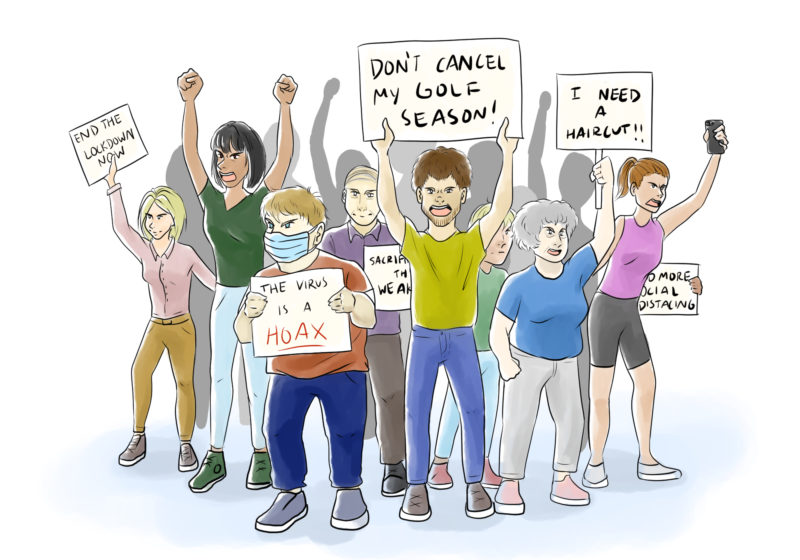When the pandemic was still in its infancy in the U.S., I refused to acknowledge its urgency. I dismissed it as another rare disease — I thought that the odds of me or anyone I know catching it were next to none. I am ashamed to admit this now.
I was in New York City on spring break when I received the fateful email. You know, the one that informed us that the rest of the semester would proceed online. The pandemic had never felt so real.
I left New York City on March 14, when there were only 613 confirmed cases in the state. Today, around a month and a half later, that number has risen to over 280,000 with almost a million confirmed cases nationwide, accounting for around a third of the world’s recorded cases.
With those numbers in mind, and considering the U.S. has the highest number of recorded cases, I’m shocked that many Americans are still in denial. Yet the anti-lockdown protests erupting in so many parts of the country are proof that this denial exists.
The protesters demand the immediate reopening of the country and economy. They claim that the stay-at-home orders are a violation of their personal liberties. The biggest protest was in Michigan, where the governor has imposed very strict stay-at-home restrictions. The president encouraged them by (of course) tweeting a series of all-caps tweets.
It is a valid fear: losing one’s job, the economy collapsing, small businesses going bankrupt. There have been around 26.5 million unemployment claims in the past month alone.
But make no mistake. These protesters are not concerned about the working class. They are not concerned about small businesses shutting down, or families being unable to support themselves.
If you don’t believe me, all it takes is a simple Google search to see some of the protesters’ signs. “I want a haircut.” “Don’t cancel my golf season.” All first-world problems. In Michigan, protesters are concerned about not being able to move between different properties, or not being able to waterski. Some have held up signs that are truly harrowing. “Sacrifice the weak. Re-open TN,” reads one. “Ban Homo marriage!” reads another. “Tyranny spreads faster than the China virus.”
These protests are an excuse to propagate hate. They are a demonstration of white privilege, and they prove what we’ve known all along: that white people can get away with anything. That a white man with an assault rifle can stand on the steps of the state capitol untouched, while a schizophrenic black man gets shot at Walmart in the middle of a mental health crisis. That hundreds of white people can defy the governor’s clear orders and get away with it, while people of color get incarcerated every day for much less. These disparities aren’t a result of COVID-19. They’ve only been highlighted as a result of it. They’ve been there all along.
It is worth noting that these protests are meticulously planned by well-funded conservative groups, as the New York Times found. These are the people who would benefit most from people going into stores and buying products. The protests have the markings of a political movement, with politicians commending protestors for “being the modern day Rosa Parks.” (I’ll let the reader be the judge of this statement). Of course, Trump’s connection to the protest isn’t proven, but there are hints of it.
Perhaps it could be a way to campaign in the middle of a pandemic (note all the MAGA signs held by protesters).
I come from a country where peaceful protesting is encouraged to pressure officials into listening to the protesters’ demands. On Oct. 17, 2019, after the government announced new taxes, and after the country had just started its dip into economic unrest, Lebanon broke out in nationwide protests against the decades of corruption. The demands were simple: return the stolen funds, reform the country’s sectarian political system, and stop exploiting the Lebanese people. The protests continued into the end of February 2020 and were only halted as a result of the arrival of the coronavirus, with promises that they will resume as soon as the pandemic is over.
Today, with the Lebanese currency still crumbling, the protests are needed more than ever, but protesters understood one thing: It was no use protesting if there would be no one left to protest for. Today, they stay indoors, avoiding social contact at all cost. Tomorrow, when it’s safe, they protest.
I’m not telling you this to gloat ( maybe a little). I’m saying this because I’ve never seen the Lebanese people this united in my lifetime — and neither have my parents since 1975. If the Lebanese people — who, mind you, have deep trust issues with their government — can do this, then so can the American people.
There was a brief moment where it felt as though humanity was coming together to fight this pandemic. I hope this is still true. I hope we still can.






